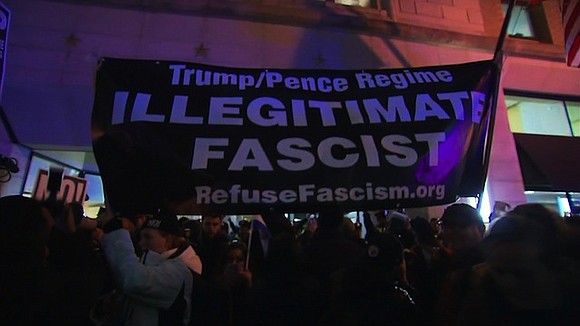Small Protests at Trump's Inauguration
CNN/Stylemagazine.com Newswire | 1/20/2017, 12:17 p.m.

By Gregory Krieg
CNN
WASHINGTON (CNN) -- Packs of coordinated protest groups attempted to block off entry points to Donald Trump's inauguration on Friday in Washington, D.C.
At one checkpoint, about 50 protesters sat down in the street in an attempt to block Trump supporters from entering a secure area to watch the swearing-in ceremony and speech. Not far away, a group of immigration backers staged a "pop up" protest near another check point.
"We're here to take a stand against the ideas that Trump spouted throughout the course of this campaign -- sexism, Islamophobia, his bigotry and nationalism," said protester Jed Holtz, from New York City.
In a series of planned demonstrations designed to cut off spectator access, protesters blocked or caused bottlenecks in front of at least a half dozen security checkpoints outside the National Mall in the hours ahead of the swearing in.
Three women were chained together at the neck on 10th Street, and more than 150 demonstrators organized by the DisruptJ20 coalition surrounded an entrance near the Canadian embassy.
"This checkpoint is closed," they chanted, forcing Trump supporters to turn back and walk along Indiana Avenue in search of a clearer path. Police are mixing in with the crowds but are mostly remaining behind security fences.
At one point, police used pepper spray as a group of protesters, many of them wearing masks, ran down 13th Street.
"I think Donald Trump is a fascist, and it's very easy for people, especially people who are in pain, to slip into fascism," said Lysander Reid-Powell, 20-year-old student from New Mexico. "We could really see our country go in a disturbing way, and so I want to obstruct that as best I can and be a part of the resistance."
There also were anti-Trump protests around the world, including in London, Hong Kong and Berlin -- where demonstrators held a sign that read, "Walls divide." In the West Bank, Palestinians protested against Israeli settlements and Trump's plan to move the US Embassy to Jerusalem from Tel Aviv.
On Thursday night in Washington, protesters gathered on 14th Street outside the National Press Club to demonstrate against "DeploraBall," an event organized by some of Trump's most fervent supporters. The name riffs off the campaign description of some Trump backers by his defeated opponent, Hillary Clinton, as a "basket of deplorables."
As attendees -- some of whom were clad in suits and red hats, others dressed in gowns -- entered the event, demonstrators chanted "Shame" and "Nazis go home" behind a phalanx of police. Some held signs that read "No Alt Reich" and "No Nazi USA."
A few demonstrators threw eggs at the National Press Club building and at revelers, though not at police.
Elsewhere in the demonstration, some protesters could be seen setting small fires in the streets. Police could be seen pepper-spraying some protesters.
Hugh Carew, a spokesman for the Metropolitan Police Department, said there were no immediate reports of injuries and he could not confirm the use of pepper spray. One person was arrested.
"This is to build up momentum and mobilize people so that whatever s--- is coming down the pipe with Trump and (Vice president-elect Mike) Pence -- their regime -- we need to be ready," said Sarko Sarkodie, 26, who lives in Washington.
Capital braced for protests
On Saturday, the Women's March on Washington could attract a quarter million participants, potentially making it one of the larger political rallies the city has seen.
"We're really trying to set a tone of resistance for the coming years," Lacy MacAuley, a DisruptJ20 organizer, told CNN. "Donald Trump represents a shift in our politics in a dangerous, harmful, exclusionary direction. We oppose those policies of hate."
According to Department of Homeland Security chief Jeh Johnson, as many as 900,000 spectators may attend inaugural ceremonies.
Johnson told reporters last week that 28,000 security personnel from dozens of agencies, including local and out of town police officers, will be fanned out across the city on Inauguration Day and into the weekend.
DC Interim Police Chief Peter Newsham told CNN that the city is prepared for a range of demonstrations. "If they're going to be nonviolent, they're going to be peaceful, then we're going to facilitate them with whatever they want to accomplish," Newsham said.
The Women's March gets ready for prime time
The Women's March begins near Capitol Hill at 10 a.m. ET Saturday. Organizers now say internal divisions, many of them stemming from a divisive Democratic primary fight, are being put aside in the name of solidarity.
"We have already proven that Hillary and Bernie Sanders supporters can work together against fascism, xenophobia, and racism," Linda Sarsour, a Palestinian-American Muslim activist from Brooklyn, told CNN.
The march, which began with a modest Facebook call in the aftermath of the election, has grown in to what could be one of the larger political demonstrations in DC.
There are more than 600 "sister marches" now planned around the country and fundraising for the event has largely come in chunks of $20 and $30 online donations.
"It really reminds me of the Sanders campaign," Sarsour said. "A very grassroots, very grass-powered movement."
CNN's Brian Todd, Sarah Ganim, Pallavi Reddy, Betsy Klein and Chris Welch contributed to this report.




